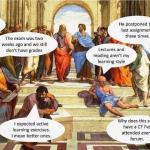“Even a good man will find it difficult to cope with old age in poverty.” (Republic, Book I)
One thing reading books from another culture, another time, and another place does is say things in a way nobody around you would say in just that way.
One old book made me think about money, happiness, and old age by saying something plainly: money helps.
Before looking at the old book, that blunt fact reminded me of some home truths I already know, but need to make sure I remember.
Money, Happiness, Old Age
Christians cannot worship money, love money, but all of us need money***! Money cannot buy happiness, is not worthy of love, but money helps happy people be happy. You can be at peace in the worst circumstances, but flourishing in this life depends on having our basic physical, mental, and spiritual needs met and this is easiest when people have decent jobs and lives that can be lived in dignity.
Christian teaching always has emphasized compassion for the poor and the right to work. Christians do disagree about how best to help the poor and how to get people good jobs****, but that should not distract us from our broad agreement:
We cannot ignore the poor or the weak and claim to be faithful Christians.
There comes a time when money making gets harder, because we are older. As a result, there is a tradition of helping the elderly that goes back to New Testament times. Charity for those who could not work, had no families, or lost savings was central to the church from the beginning.
Old age in an industrial society was harder than in agricultural states. The family farm or business was no longer the main way of making money. The basic pension plan for Christians is the family. Strong families provide the ultimate security as people will care for each other out of love in ways that no money can buy. Children have a moral responsiblity to help their parents financially, but that is not always possible. What should a Christian society do when it is not?
Christian nations with many types of governments (Kaiserein Germany or Christian Democratic parties in Europe) developed old age pensions and plans almost as soon as rising wealth permitted such programs. Whatever the downsides, Social Security and other old age programs in the United States surely have been successful in lessening the fear of starvation or destitution in the elderly. Yet it would be a mistake to think that government programs were or are the only solutions.
Free markets help not just the rich, but even middle class people to invest savings for retirement and so produce future income that does not depend on maintaining a daily job. Freedom has pulled millions out of poverty and given them the ability to save for their own retirements.
All of these strategies help and all must be considered.
Why?
Grinding poverty is inhuman. Statist regimes tend to produce grinding poverty. When a state destroys pensions or creates turmoil in the economy, as Venezuela has done, then it creates the conditions for such poverty. The elderly, like the very young, find it harder to make it in an unstable situation. On the other hand, pretending that all poverty in the old is the fault of the poor is both false and inhuman.
If we should never throw money at a problem, sometimes a lack of money is the problem.
And yet, let us become the kind of person money could help!
If you give some people a necessary boost, they flourish and often never need help again. In a free economy, getting the funds is easier than becoming the sort of person the funds could help. This is complicated because poverty is both caused by and is the cause of bad choices.
Leaving aside, however, what we cannot control, most of us could do better jobs becoming better. A good person who gets a good financial break will flourish. It is much harder to help us, if our vices have consumed us. I must begin with myself (to be safe) and ask if I am becoming the kind of person that more money could help or harm.
Socrates (the father of philosophy) is talking to an old man and he gets a mix of good advice and bad. Ultimately, he will discover that Cephalus (literally the “Head” of the community gathering to talk) is not interested in wisdom. Socrates still learns from him. He notes that Cephalus is rich and that may be one reason he enjoys a happier old age than most:
I should imagine, Cephalus, that when you talk about these matters, most people remain unconvinced. They think it is not your character that lends grace to your age but rather your fortune. They would likely observe that the rich enjoy many compensations.
You are right, Socrates. Most people don’t accept what I say. Their objection carries some weight, but not that much. I am reminded how Themistocles once responded to a man from the small island of man was being abusive, asserting that Themistocles owed his fame not to his own prowess but to the power of Athens. Themistocles conceded that had he also been horn in Scriphus, fame would surely have eluded him. But, he added, the Seriphian would have won no fame in life even had he been a man of Athens. Themistocles’ retort offers a good analogy to the case of those who lack wealth and complain of old age. It is true that even a good man would find it rather difficult to cope with old age in poverty. But a bad man, however great his wealth, can never hope that old age will endow him with contentment and a cheerful temper.
Cephalus is willing to admit what few of us do. We owe a lot to where, when, and to whom we were born. Nobody is “self-made” in totality. He inherited some wealth, was born in Athens (the freest city in the world of his day), at a time when the city was prospering. He makes a key point, however: Cephalus could handle the blessings, because of choices he made.
Too many of us (God forgive me!) get a change and then blow it. We are not ready to do good when we do well. Instead, like the children of Israel, blessings bring out our inner problems. The lottery winner who has been saved from his vices by poverty is not lucky when he wins. Instead, the money can be the means of making him more miserable than poverty ever could.
Notice that Plato (like Christianity) concedes that material blessings are good and aid in human flourishing. He also pushes back (later in Republic) against the false idea that material blessings are the goal! Having a certain amount of money gives Socrates the time to found philosophy. Having financial support allowed Jesus to conduct his ministry. Grinding poverty keeps people from having the time or energy to consider their wisdom.
We must help others avoid grinding poverty.
Second, Plato has Socrates and Cephalus admit that all our “blessings” are not due to our efforts. The same is true of our liabilities. If you are born on third base, you did not hit a triple. You should also try to use that advantage to score for the team and not squander it by getting picked off.
Nobody is “self-made,” but our choices count.
These are two pretty good lessons for our summer in the Republic.
———————————————-
*I begin an informal summer reading of Republic using Scott/Sterling (a new translation for me). Part 1. Part 2. Part 3. Part 4. Part 5. Part 6. Part 7. Part 8.
**I have no idea how much of what I know is just Professor Al Geier filtered through my eccentricity. Here is to you Al!
***I am using “money” as a placeholder for goods and services that money can buy.
****Bias: I am in the American context a person who favors more liberty with fewer laws or social programs at the government level. However, like Reagan I favor a strong social safety net. Like Jack Kemp, I favor laws and programs that maximize opportunity in historically harmed communities.













